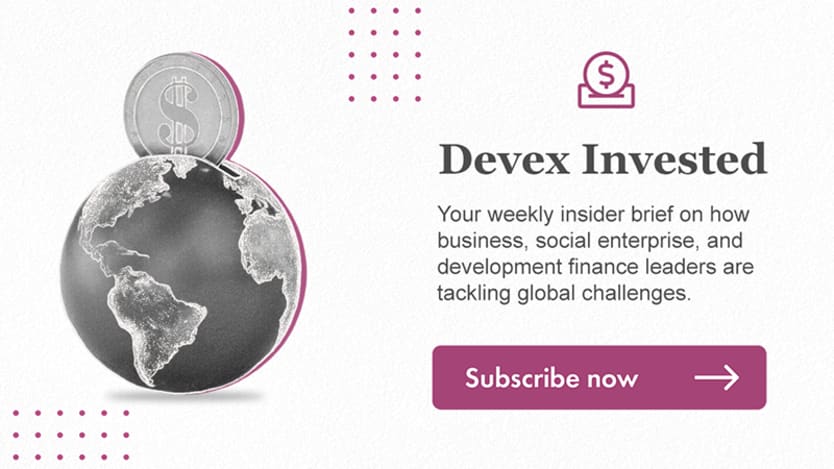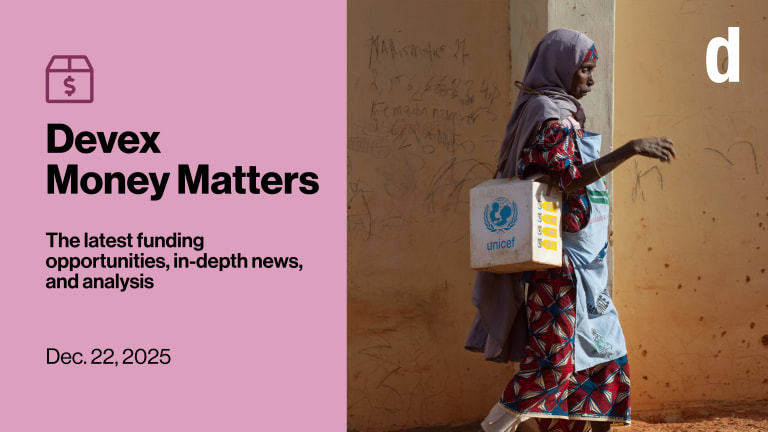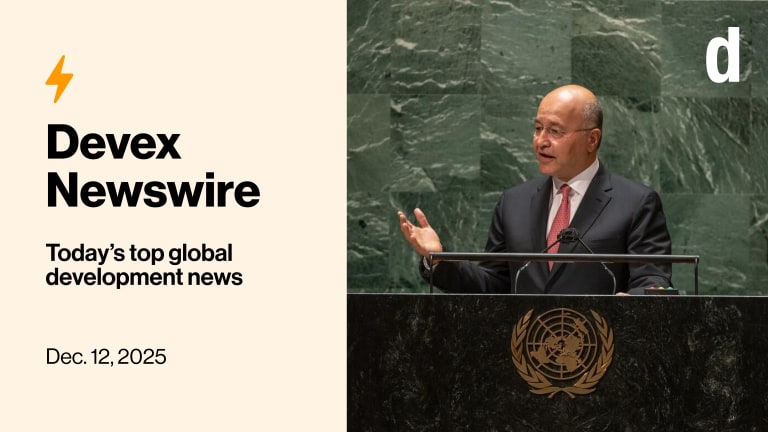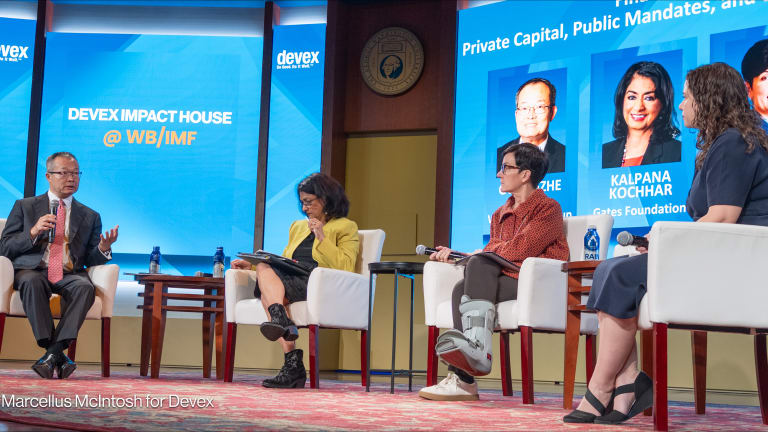
The European Union wants to get the private sector more involved in humanitarian aid. It’s just not sure where to start.
Following our interview about Ukraine last week, I asked Janez Lenarčič, the bloc’s crisis management commissioner, what he’d like to see come from the inaugural European Humanitarian Forum on March 21-23. He answered with a reference to his department’s plan, outlined in a policy paper last year, to “Significantly increase the resource base for humanitarian action.”
This is a preview of Devex Invested
Sign up to this weekly newsletter inside business, finance, and the SDGs, in your inbox every Tuesday.
The European Commission, U.S., and Germany are by far the world’s largest humanitarian donors. Lenarčič said he’d like to see more private sector proposals on how to narrow the funding gap that saw just 52% of humanitarian requirements met in 2020. Got an idea? You can reach his team here: cab-lenarcic-contact@ec.europa.eu.
The commission also wants to get companies more involved in service delivery. Elrha, a charity working on humanitarian research and innovation, last week launched its Global Prioritisation Exercise — an initiative looking at what new approaches are being funded, where, and by whom, as well as whether locals in crisis settings have been involved.
Elrha CEO Jess Camburn tells me that so far, solar and water-purifying technologies are among the innovations that can be offered at cost to humanitarian groups in a crisis while also being sold for profit in other markets. However, she says the humanitarian sector needs a common ethical framework to support altruistic partnerships with the private sector.
Do you plan to attend the European Humanitarian Forum or have a tip for what we should be covering? I’m at vince.chadwick@devex.com.
All eyes on Ukraine
As the human cost of Russia’s war on Ukraine continues to grow, Filippo Grandi, the U.N. high commissioner for refugees, says the IKEA Foundation is “leading the way for the private sector” with its emergency donation to support displaced Ukrainians.
The foundation and the companies behind the IKEA brand have committed a total of €40 million in humanitarian assistance to Ukrainians since the Russian invasion, including €20 million for the UN Refugee Agency.
IKEA Foundation CEO Per Heggenes tells my colleague Stephanie Beasley that now is the time to “be flexible and work with the partners that we know well and that we know can deal with making the right decisions locally.”
The United Nations’ Connecting Business initiative also has a guide on what the private sector can do now — as well as what it should not do.
“[Refrain] from sending unsolicited donations that may not correspond to identified needs or meet international quality standards,” it reads. “Donors are encouraged to send financial/cash donations rather than in-kind donations.”
IKEA Foundation chief: The challenges of predicting Ukraine aid needs (Pro)
Graduation day
The results are out today on the first development impact bond to focus on poverty alleviation in sub-Saharan Africa. The Village Enterprise DIB, launched in 2017, was also the first to bring in major donors like the U.S. and U.K.
What is it? A DIB is a results-based financing mechanism that allows investors to provide capital for an intervention by a service provider. The investors’ return — in the case of the Village Enterprise DIB, a full payout amounting to a roughly 8% internal rate of return, or annual growth rate — is given by donors, provided that certain results are achieved.
How does it work? This DIB used a so-called poverty graduation program to help small groups of “ultra-poor” community members start microenterprises by providing them with training and a $100 grant — plus a supplemental grant if the business is successful — to build their assets and savings. Some 14,000 entrepreneurs in Uganda and Kenya took part, spending about $10 more each month than those in a control group.
The outcome: That extra money paid for more food, goods, and health care services — and IDinsight, the outcome evaluator, estimated the program would generate impacts of more than $21 million for communities. That’s about four times the overall cost of the program.
“In many ways, the bond has been a test of not only the poverty graduation model, but also the use of DIBs,” my colleague Adva Saldinger writes.
Go in-depth: How this DIB hit targets in Uganda, Kenya
Gates on gender
To mark International Women’s Day, my colleague Miguel Antonio Tamonan has this look at how the Gates Foundation has been spending in support of gender equality.
By the numbers:
• $2.1 billion — the amount the foundation has pledged to spend worldwide on gender equality over the next few years, including $650 million for women’s economic empowerment.
• $765.42 million — the amount the foundation has spent since 2009 under its “empower women and girls” category of grants.
• $1.8 million — the average size of grants for government agencies and local organizations to advance gender goals.
• 79% — the share of women empowerment-related grants won by U.S.-based organizations. (India, Kenya, and Ghana did best in terms of grant money among low- and middle-income countries.)
IWD: How much has the Gates Foundation spent on women’s empowerment? (Pro)
And don’t miss: 2.4 billion women lack the same economic rights as men, World Bank says
Your next job?
Invested readers know we’ve been following the European Investment Bank’s creation of a new branch for its work outside the EU. (If you missed it, catch up on the details.) But now the question is: Who will lead it? The bank advertised the job recently, and it’s an instructive read.
One task for the successful candidate will be “Establishing and nurturing a development culture, making proposals to improve current policies and practices” — an area where the Luxembourg-based lender was found wanting in the expert reports on EU development finance in recent years. Applications close March 16.
+ Explore opportunities on Devex’s job board
What we’re reading
The Global Energy Alliance for People and Planet, which launched during COP 26, is staffing up as it attracts private capital to green energy projects in the global south. [Devex Pro]
EBRD “should be at the center at any efforts to rebuild Ukraine and support countries impacted by the invasion.” [The Hill]
The global backlash to Russia’s invasion of Ukraine highlights the risks of investing in emerging markets. [Financial Times]
+ What we’re listening to: How the 27-nation European Union came around on sanctions for Russia. [“The Daily”]
Update, March 10, 2022: This article has been updated to clarify the type of return that investors saw through the DIB.









